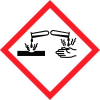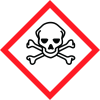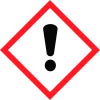Dichlorodimethylsilane
TCI AMERICA
Revision date : 2015-11-10



Note: Ingredients listed on restricted chemical lists
General Information
Revision date
2015-11-10
Product name
Dichlorodimethylsilane
CAS No.
75-78-5
Emergency telephone
Chemical Emergencies
Icons in SDS
Company Information
Company name
TCI AMERICA
E-mail address of the competent person responsible for the Safety Data Sheet
sales-US@TCIchemicals.com
GHS Information
Signal word
Danger!
Section 2
SECTION 2: Hazards identification
OSHA OSHA Haz Com: CFR 1910.1200: Acute Toxicity - Inhalation [Category 3] Skin Corrosion/Irritation [Category 2] Eye Damage/Irritation [Category 1] Specific Target Organ Toxicity (Single Exposure) [Category 3] Flammable Liquids [Category 2] Corrosive to Metals [Category 1]
Signal word
Danger!
Hazard statements
Causes serious eye damage Causes skin irritation Highly flammable liquid and vapor May be corrosive to metals Toxic if inhaled May cause respiratory irritation.
Hazard pictograms
or Symbol(s)
Prevention
Do not breathe fume, mist, vapors or spray. Use only outdoors or in a well-ventilated area. Wash hands and face thoroughly after handling. Wear protective gloves. Wear eye protection. Wear face protection (full length face shield). Avoid breathing fume, mist, vapors or spray. Keep away from heat, sparks, open flames or other hot surfaces. - No smoking. Keep container tightly closed. Ground or bond container and receiving equipment. Use explosion-proof electrical, ventilating, lighting, and equipment. Use only non- sparking tools. Take precautionary measures against static discharge. Wear protective gloves, eye protection and face protection. Keep only in original container.
Response
If inhaled: Remove person to fresh air and keep comfortable for breathing. Call a poison center or doctor. If on skin Wash with plenty of water. If skin irritation or rash occurs Get medical advice/attention. Take off contaminated clothing and wash it before reuse. If in eyes: Rinse cautiously with water for several minutes. Remove contact lenses, if present and easy to do. Continue rinsing. Immediately call a poison center or doctor. Call a poison center or doctor if you feel unwell. If on skin (or hair): Take off immediately all contaminated clothing. Rinse skin with water or shower. In case of fire: Use dry chemical, CO2, water spray or alcohol-resistant foam to extinguish. Absorb spillage to prevent material damage.
Storage
Store in a well-ventilated place. Keep container tightly closed. Store locked up. Store in a well-ventilated place. Keep cool. Store in corrosive resistant container with a resistant inner liner.
Disposal
Dispose of contents and container in accordance with US EPA guidelines for the classification and determination of hazardous waste listed in 40 CFR 261.3. (See Section 13)
2.3 Other hazards
HNOC] Lachrymator

